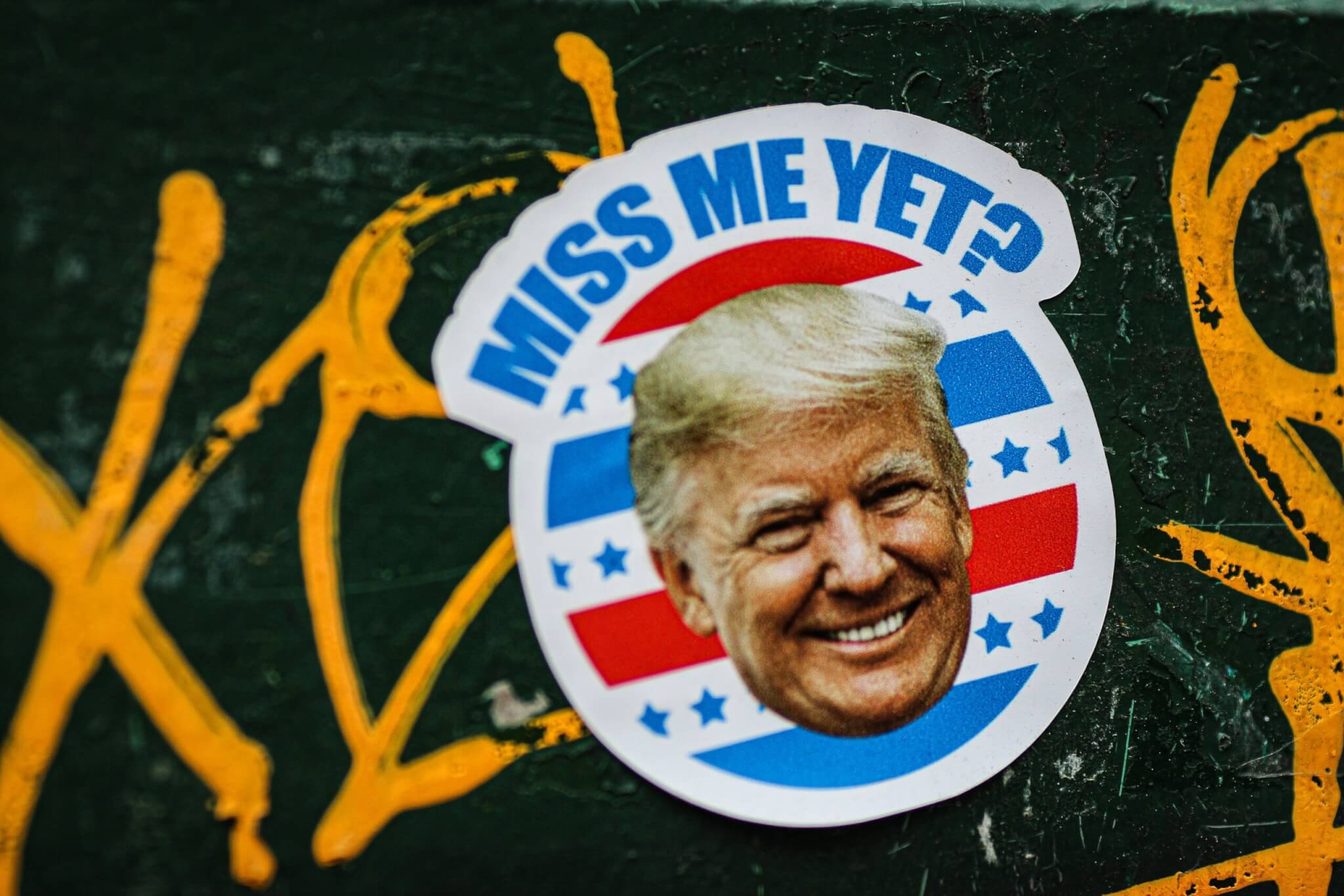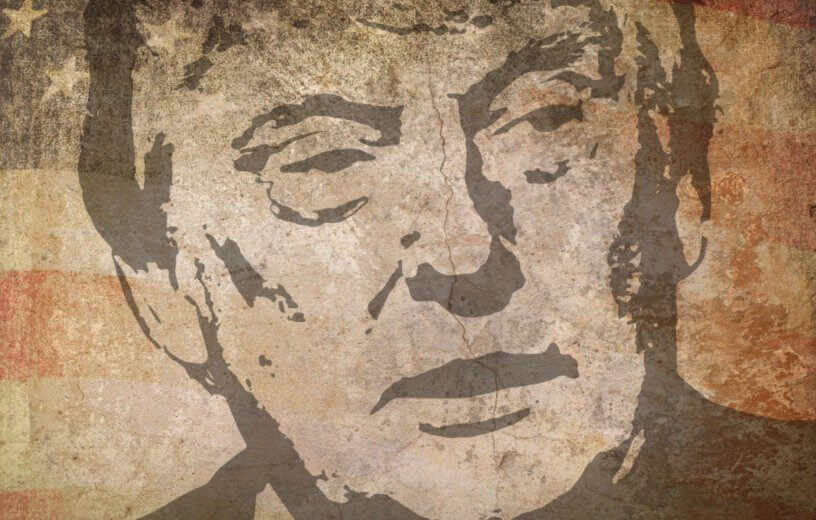A Manhattan grand jury has voted to indict former President Donald Trump. The specific state felony charges, reports The New York Times, “remain a mystery” but will be related to the Manhattan district attorney’s investigation of Trump for making hush money payments to a porn star just before the 2016 presidential election.
It’s the first time a U.S. president or former president has been indicted. At the same time, Trump is expected to continue his campaign for the presidency, seeking to regain in 2024 the position he lost in 2020 to Joe Biden.
What are the consequences of an indictment and potential trial for his campaign and, if his effort is successful, his future presidency? Article II of the U.S. Constitution sets forth very explicit qualifications for the presidency: The president must be 35 years of age, a U.S. resident for 14 years and a natural-born citizen. In cases involving analogous qualifications for members of Congress, the Supreme Court has held that such qualifications form a “constitutional ceiling” – prohibiting any additional qualifications to be imposed by any means.
Thus, because the Constitution does not require that the president be free from indictment, conviction or prison, it follows that a person under indictment or in prison may run for the office and may even serve as president. This is the prevailing legal standard that would apply to former President Trump. The fact of his indictment and potential trial is irrelevant to his qualifications for office under the Constitution.

Nevertheless, there seems no question that indictment, conviction or both – let alone a prison sentence – would significantly compromise a president’s ability to function in office. And the Constitution doesn’t provide an easy answer to the problem posed by such a compromised chief executive.
Governing from jail?
A presidential candidate could be indicted, prosecuted and convicted by either state or federal authorities. Indictment for a state crime may seem less significant than federal charges brought by the Department of Justice. Ultimately, though, the spectacle of a criminal trial in state or federal court would have a dramatic effect on a presidential campaign and on the credibility of a president, if elected.
All defendants are presumed innocent until proved guilty. But in the case of conviction, incarceration in state or federal prison involves restrictions on liberty that would significantly compromise the president’s ability to lead.
This point – that functioning as president would be difficult while under indictment or after being convicted – was made plain in a 2000 memo written by the Department of Justice. The memo reflected on a 1973 Office of Legal Counsel memo produced during Watergate titled “Amenability of the President, Vice President and other Civil Officers to Federal Criminal Prosecution while in Office.” The background to the 1973 memo was that President Richard Nixon was under investigation for his role in the Watergate break-in and Vice President Spiro Agnew was under grand jury investigation for tax evasion.
These two memos addressed whether a sitting president could, under the Constitution, be indicted while in office. They concluded he could not. But what about a president indicted, convicted, or both, before taking office, as could be the case for Trump?
In evaluating whether a sitting president could be indicted or imprisoned while in office, both the 1973 and 2000 memos outlined the consequences of a pending indictment for the president’s functioning in office. The earlier memo used strong words: “[t]he spectacle of an indicted President still trying to serve as Chief Executive boggles the imagination.”
Even more pointedly, the memos observe that a criminal prosecution against a sitting president could result in “physical interference with the President’s performance of his official duties that it would amount to an incapacitation.” The memo here refers to the inconvenience of a criminal trial that would significantly detract from the president’s time commitment to his burdensome duties.
But it’s also lawyer’s language to describe a more direct impediment to the president’s ability to govern: He might be in jail.
Core functions affected
According to the 1973 memo, “the President plays an unparalleled role in the execution of the laws, the conduct of foreign relations, and the defense of the Nation.”
Because these core functions require meetings, communications or consultations with the military, foreign leaders and government officials in the U.S. and abroad in ways that cannot be performed while imprisoned, constitutional law scholar Alexander Bickel remarked in 1973 that “obviously the presidency cannot be conducted from jail.”
Modern presidents are peripatetic: They travel nationally and globally on a constant basis to meet with other national leaders and global organizations. They obviously wouldn’t be able to do these things while in prison. Nor could they inspect the aftermath of natural disasters from coast to coast, celebrate national successes and events or address citizens and groups on issues of the day, at least in person.

Moreover, presidents need access to classified information and briefings. But imprisonment would also obviously compromise a president’s ability to access such information, which must often be stored and viewed in a secure room that has been protected against all manner of spying, including blocking radio waves – not something that’s likely available in a prison.
As a result of the president’s varied duties and obligations, the memos concluded that “[t]he physical confinement of the chief executive following a valid conviction would indisputably preclude the executive branch from performing its constitutionally assigned functions.”
Translation: The president couldn’t do his job.
Running from prison
Yet what to do if citizens actually elect an indicted or incarcerated president? This is not out of the question. At least one incarcerated presidential candidate, Eugene Debs, garnered almost a million votes out of a total 26.2 million cast in the election of 1920.
One potential response is the 25th Amendment, which enables the president’s Cabinet to declare the president “unable to discharge the powers and duties of his office.”
The two Department of Justice memos note, however, that the framers of the 25th Amendment never considered or mentioned incarceration as a basis for the inability to discharge the powers and duties of the office. They write that replacing the president under the 25th Amendment would “give insufficient weight to the people’s considered choice as to whom they wish to serve as their chief executive.”
All this brings to mind Justice Oliver Wendell Holmes’ admonition about the role of the Supreme Court: “If my fellow citizens want to go to Hell I will help them. It’s my job.”
Holmes’ statement came in a letter reflecting on the Sherman Antitrust Act, which he thought was a foolish law. But Holmes was prepared to accept the popular will expressed through democracy and self-determination.
Perhaps the same reflection is apt here: If the people choose a president hobbled by criminal sanctions, that is a form of self-determination too. And one for which the Constitution has no ready solution.![]()
Article written by Stefanie Lindquist, Foundation Professor of Law and Political Science, Arizona State University
This article is republished from The Conversation under a Creative Commons license. Read the original article.

Trump should be standing trial for all those people killed in the insurrection that he brought about with insidious rally, his ‘Proud Boys’, and other violent seditious sects working with him in his attempt to overthrow our elected government. Nine dead and the blood is on his hands 100%! In a sane world he would be headed to the gallows already. The man is worse than dangerous!
And yet, he’s NOT. That’s because that rally was protected by free speech. That’s also because no one was killed, except Ashli Babbitt & that was under highly suspicious conditions. Note the powers that be tried to HIDE the identity of her killer. The others who died did so because of unrelated conditions. If Proud Boys was “seditious,” then are you saying the Department of Justice isn’t doing its job under Biden? Fox showed a lot of unedited footage of that day & it looked nothing like the edited clips shown on other media.
I believe that this indictment and subsequent conviction(s) which might arise from it only will serve to strengthen the likelihood that Trump will be nominated and very possibly elected. Moreover, any conviction(s) most certainly will go all the way to the United States Supreme Court, and Trump most likely will not be serving time while the appeal(s) remain undecided.
Very little about New York is well regarded by much of America beyond the two left coasts, and a large number of Americans already have decided that the most intensely investigated American in history is being unfairly targeted by “bad” people. Many, if not nearly all, of these people will rally around Trump regardless of any other considerations.
Moreover, fair-minded people can see the dual nature of our justice system which has developed as our institutions have become politicized. For the most part, nearly all of our national institutions have lost much of their credibility in recent years and what they say or what they do no longer carries much weight with a great number of Americans.
This indictment likely will propel Trump in ways unintended by those who have instigated it.
We are now a third-world country.
NYC will likely have a pretty serious traffic jam on Tuesday. Bragg will not get the privilege of walking the streets anymore, without getting protested, up close and personal
You have one in the Senate governing from the looney bin!
A little fishy since this is not a federal crime. A billionaire paying a ex lover to keep quiet is with in normalcy imho.
The charges are state level. Meaning Desantis can block his extradition. It is a political attack. He paid a ex lover. She called him small per pee, he called her horse face.
Make better love decisions.
I had similar issues. The females I chose are horrible. They put me in a bad light.
Like it or not he is a former president. Even if he is convicted he would never see a prison cell. The secret service has jurisdiction over his security and would assert their authority on the location of Trump.
While the Constitution does not bar a felony from being president, multiple states preclude ballot access to felons. It will be interesting to see, if convicted, whether he will be on all 50 states ballots.